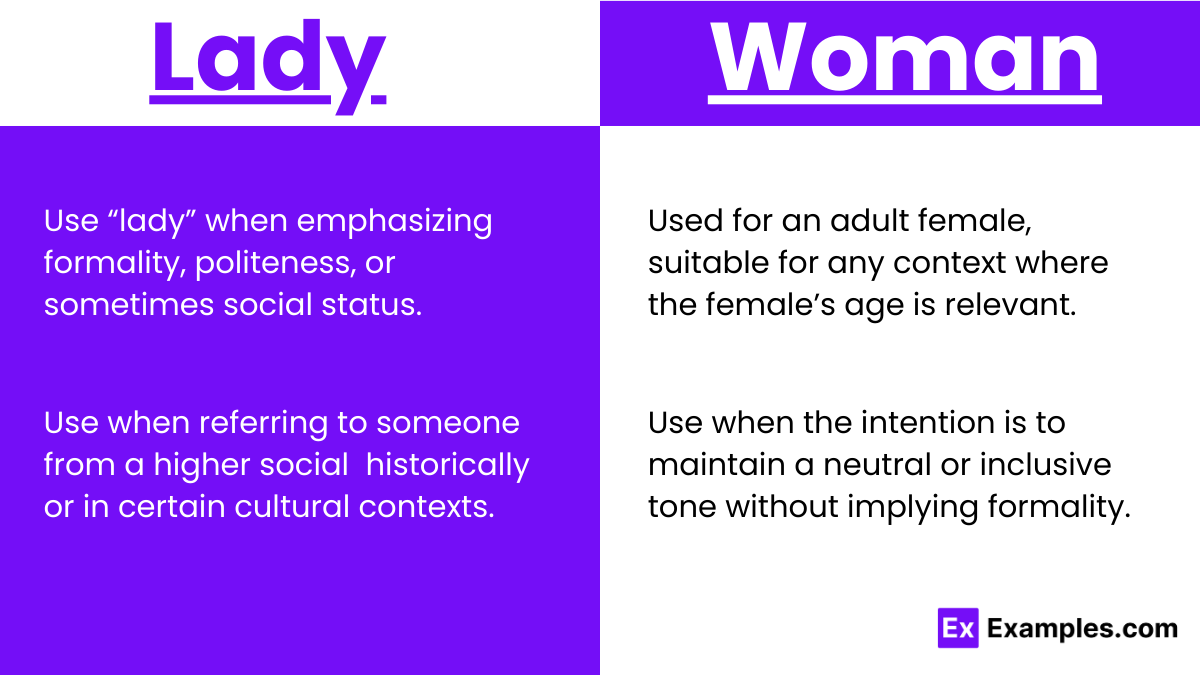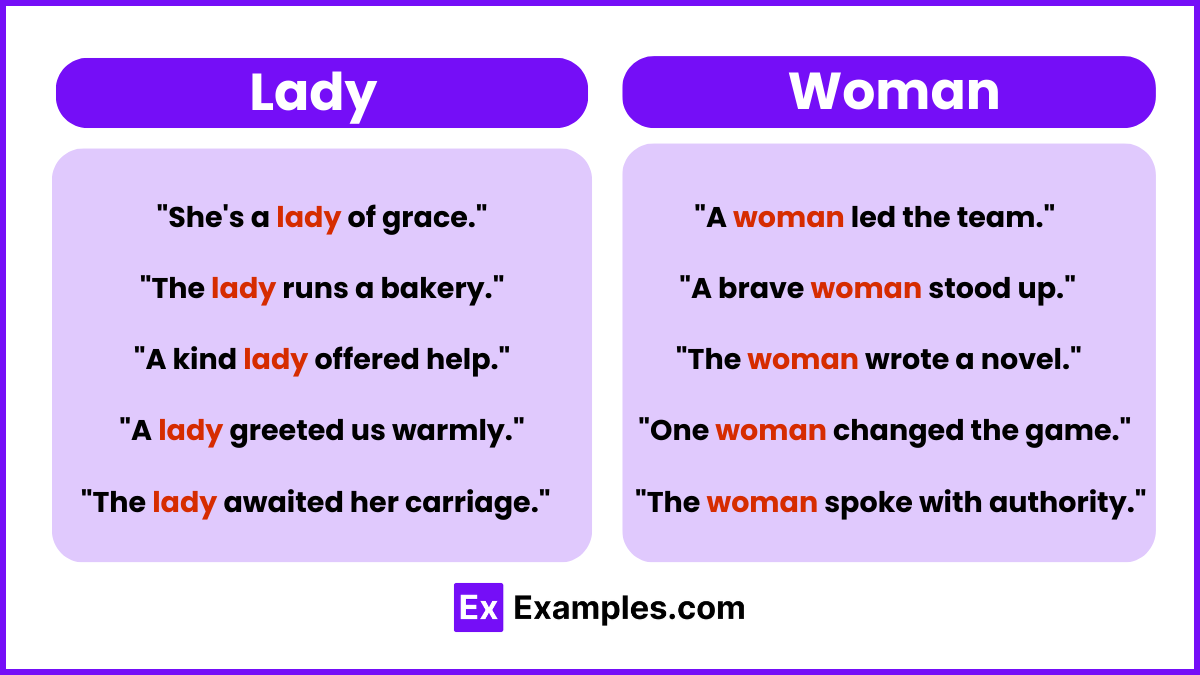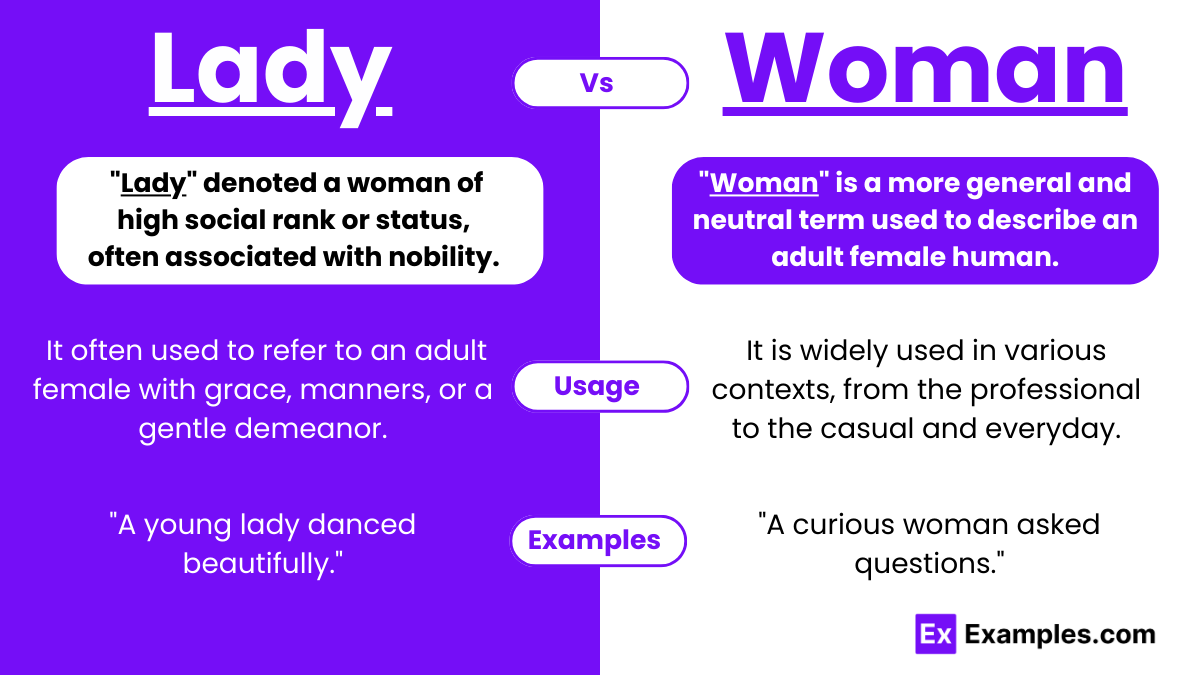Lady vs Woman
When it comes to the English language, certain words can be a bit tricky to use correctly, and two such words are “lady” and “woman.” You might have found yourself unsure of which word to use in different situations. Is it more appropriate to call someone a lady or a woman? The differences might seem small, but they’re quite important. In simple terms, “woman” refers to an adult female person, while “lady” carries a nuance of elegance, refinement, and polite manners. This guide aims to clear up the confusion, helping you understand when and how to use these terms appropriately, ensuring you won’t accidentally offend someone by using the wrong word.
Lady and Woman – Meanings
- Lady: The term “lady” has a multifaceted usage in English. Historically, it denoted a woman of high social rank or status, often associated with nobility. In contemporary usage, “lady” can still convey a sense of formality or politeness and is often used to refer to an adult female with grace, manners, or a gentle demeanor. The use of “lady” can sometimes imply respect or deference, especially in formal or polite contexts.
- Woman: “Woman” is a more general and neutral term used to describe an adult female human. This term does not inherently carry connotations of social status, manners, or grace. It is widely used in various contexts, from the professional and academic to the casual and everyday. The term “woman” emphasizes the adult female’s identity without additional layers of social or cultural implication.
Summary
“Lady” often carries with it an air of formality, grace, or politeness, sometimes linked to social status or respect. For instance, in a formal event, you might hear, “The lady in the red dress gave a remarkable speech.” In contrast, “woman” is a more neutral and inclusive term, focusing simply on identifying someone as an adult female. If discussing a professional achievement, one might say, “The woman leading the project has extensive experience.”
How to Pronounce Lady and Woman
- Lady: Pronounced as /ˈleɪ.di/ (lay-dee).
- Woman: Pronounced as /ˈwʊm.ən/ in the singular and /ˈwɪm.ɪn/ for the plural “women” (wuh-muhn).
Differences between Lady and Woman
| Aspect | Lady | Woman |
|---|---|---|
| Connotation | Often implies formality, grace, or social status. | Neutral, focusing on identifying an adult female without additional implications. |
| Usage | Used in more formal or polite contexts. | Broadly used in various contexts without specific connotations of formality or status. |
| Social Implications | Can carry historical or cultural associations with nobility or high social standing. | Lacks inherent associations with social status or manners. |
| Example Context | “The lady at the embassy was very helpful.” | “The woman who wrote that book is speaking tonight.” |
How to Remember the Difference between Lady and Woman
To easily remember the difference between “lady” and “woman,” consider the context and the additional layers of meaning “lady” might bring. If the context is formal, or if there’s an intention to convey respect, grace, or social status, “lady” might be more appropriate. In contrast, “woman” is the go-to term for general references to adult females, free of additional connotations.
When to Use Lady and Woman

Usage of Lady
Use “lady” when emphasizing formality, politeness, or sometimes social status. It’s also appropriate when addressing someone in a respectful manner or when referring to someone who embodies grace and manners.
- Formality or Politeness: In contexts that call for a more formal or respectful tone.
- Social Status: When referring to someone from a higher social or noble class, historically or in certain cultural contexts.
- Grace and Manners: To highlight the gracefulness or refined manners of an adult female.
Usage of Woman
Use “woman” as the general term for an adult female, suitable for any context where the female’s age is relevant, and there’s no need to imply additional connotations of status, manners, or formality.
- General Reference: When simply referring to an adult female without additional implications.
- Professional or Academic Settings: In contexts where the focus is on the individual’s role or achievements, regardless of their manners or social status.
- Neutral Tone: When the intention is to maintain a neutral or inclusive tone without implying formality.
Lady and Woman – Examples

Examples of Lady
- The lady chairing the meeting has a reputation for fairness.
- That lady over there has been waiting for her order for quite a while.
- The young lady in the library offered me assistance with the archives.
- Thank you, ladies and gentlemen, for your attention.
Examples of Woman
- The woman leading the research team has published numerous articles.
- A woman called earlier asking for you, but she didn’t leave a name.
- Every woman has the right to make her own choices.
- Women around the world are breaking barriers in various fields.
Synonyms
| Lady | Woman |
|---|---|
| Gentlewoman | Adult female |
| Dame | Female |
| Madam | Individual |
| Mistress | Person |
Exercise
Fill in the blanks with either “lady” or “woman“:
- The _____ at the front desk will help you with check-in.
- Every _____ has the potential to achieve great things.
- The _____ who runs the local charity has been nominated for an award.
- She is a _____ of great talent and compassion.
- The young _____ was praised for her exemplary behavior at the ceremony.
- That _____ has been my mentor and guide for many years.
Answers
- lady
- woman
- woman
- lady
- lady
- woman.
FAQ’S
What makes a woman a lady?
A woman becomes a lady through refined behavior, elegance, and courteous manners, distinguishing her in social contexts.
When can a woman use the title lady?
A woman may use the title “lady” in formal or high societal contexts, often linked to noble titles or respectful address.
Can I call a woman a lady?
Yes, you can call a woman a lady, especially if she displays grace and refinement, but context matters to avoid misunderstandings.
Is it rude to call someone a lady?
It’s not inherently rude to call someone a lady, but consider the setting and the individual’s preference to ensure it’s appropriate.
When a man calls a woman a lady?
When a man calls a woman a lady, it often implies he sees her as dignified and respectable, reflecting positive recognition.


